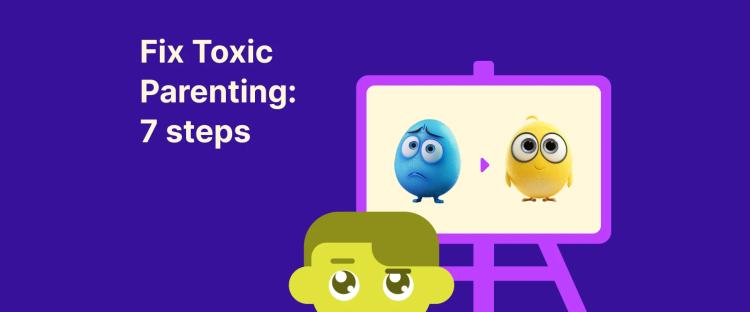Have you ever wondered how to be a calm mother, especially even when your patience is running thin? Becoming a calmer parent is possible with the right strategies and expert insights. Follow seven simple steps — from self-care practices to boundary-setting techniques — to handle stress and thrive in motherhood.
Inspired by family books and parenting guides, such as 'The Whole-Brain Child' by Daniel J. Siegel and Tina Payne Bryson and 'Hardcore Self Help' by Robert Duff, these tips come from Headway's library of book summaries — a self-learning tool with over 1700+ book summaries of bestsellers on productivity, personal growth, and family dynamics. Find your strategy and begin transforming your parenting style today!
Disclaimer: This article is for informational purposes only and should not replace professional advice from a clinical psychologist or healthcare provider.
Quick tips to become a calmer parent:
Prioritize self-care: Start your day with a calming morning routine, even if it's just 10 minutes of silence or meditation.
Practice mindfulness: Take 2–3 minutes to practice mindful breathing or use the 4-7-8 method to restore calm.
Set boundaries: Create "no screen" times to foster family connections and learn to say "no" when overextended.
Acknowledge your triggers: Track your stressors in a journal to identify patterns and manage emotional triggers.
Model calmness for your kids: Respond thoughtfully in stressful situations to teach your kids emotional regulation.
Keep reading for more tips on emotionally balanced motherhood!
📘 Want calm that actually lasts? Get Headway for self-care wisdom from wellness experts!
How to be a calm mom: Seven steps toward stress-free parenting
What does it mean to be a calm mother? According to family consultant Kim John Payne and educational writer Lisa Ross, a calm parent can manage their "own emotions and actions" and control their reactions in stressful situations.
With expert guidance and support, you can develop effective self-regulation techniques and apply them in real-life situations.
1. Prioritize self-care: Recharge to stay calm
Helpful exercises:
Practice a morning routine that energizes your body and mind, such as silence, exercise, or reading.
Take time for yourself in the morning, even if it's just 10 minutes.
Use journaling to reflect and reset after a busy day.
Do you often feel like there's no time for yourself amidst the whirlwind of parenting? It's easy to neglect your needs, but remember that taking care of yourself is crucial to staying calm.
Hal Elrod's 'Miracle Morning' is your guide to give yourself a timeout and create a morning routine that energizes and prepares you for the day ahead. He recommends six practices: Silence (meditation), affirmations, visualization, exercise, reading, and scribing (journaling).
Start your day by taking 10 to 15 minutes to sit quietly or meditate. This short pause allows you to relax before the day gets busy. Doing this regularly can help you feel calmer and make your daily tasks easier to manage.
2. Reduce stress with mindfulness techniques
Helpful exercises:
Take a moment to breathe slowly and calmly for 2 to 3 minutes.
Set aside 10 minutes each day for meditation or journaling.
Use meditation apps to guide your mindfulness practice.
Do you find it hard to stay calm when everything feels like it’s spinning out of control? Mindfulness is a simple yet powerful way to regain composure and calm your mind.
In '10% Happier,' Dan Harris emphasizes the importance of mindfulness and meditation for managing stress and improving mental health. One of his techniques is "Mindful breathing," where you simply focus on your breath for a few minutes to regain composure and calm down.
The next time you feel overwhelmed, pause and take a few slow, deep breaths. Try the 4-7-8 technique: inhale for 4 seconds, hold for 7 seconds, and exhale for 8 seconds. This technique, as suggested by experts like Harris, can help bring you back to a calm, balanced state.
For more tips, read the full summary of '10% Happier' by Dan Harris on the Headway app!https://makeheadway.com/library/books/10-happier-summary/
3. Set healthy boundaries for emotional well-being
Helpful exercises:
Schedule "no screen" times to ensure family time is uninterrupted.
Learn to say "no" when you feel over-extended — your time is valuable.
Establish clear expectations for family members regarding respect for personal space and time.
Do you often feel overwhelmed by your parenting responsibilities? If so, setting clear boundaries is key to maintaining calm and emotional balance.
Simplifying your environment and setting boundaries can create a calmer family life. This approach can also reduce the constant "mental load" many mothers feel, helping you stay present and calm.
Start by setting a rule in your household that certain times of the day (like dinner or weekends) are "no screen" times. Use this as a boundary to reconnect with your family and yourself, free from distractions.
4. Break free from toxic parenting: Heal from the past
Helpful exercises:
Acknowledge how your past experiences shape your responses.
Practice emotional awareness to break cycles of frustration or anger.
Consider therapy or journaling to address deeper emotional wounds.
Do you find yourself repeating the same patterns of stress and frustration that you witnessed growing up? It's possible to break free from these cycles and find new ways to stay calm in your parenting.
📘 Ready to rewrite your story? Start Headway for healing wisdom from trauma experts!
In 'Toxic Parents,' Susan Forward and Craig Buck highlight how unresolved issues with your parents can affect your parenting style:
"As you gain more control over your past and present relationship with your parents, you will discover that your other relationships, especially your relationship with yourself, will improve dramatically."
Recognizing these toxic patterns is key to breaking free and preventing them from impacting your little ones.
For example, if you grew up in a household where suppressing your emotions was normal, you might unconsciously bottle up your feelings. If you notice you are reacting to your child in the same way, try to pause and recalibrate your response.
5. Build emotional intelligence in yourself and your kids
Helpful exercises:
Use "connect and redirect" to handle challenging moments with your children.
Stay mindful of your emotional tone to teach your child emotional regulation.
Pause before reacting; your calmness will set the example for your child.
Do you want to teach your children emotional resilience and self-regulation? The key lies in modeling calmness and emotional intelligence yourself.
📘 Want to raise emotionally strong kids? Get Headway for psychology secrets from child development pros!
Siegel and Bryson's 'The Whole-Brain Child' provides insights into how a mother's emotional regulation can directly influence a child's development. They suggest using "connect and redirect" as a tool to calm your child when they're upset: first, connect with empathy, and then redirect to a solution or calming activity.
The next time your child acts out, take a deep breath and acknowledge their feelings instead of reacting with frustration. Then, guide them gently toward a solution, such as a quiet activity or a calm conversation.
Get more insightful takeaways from the full summary of 'The Whole-Brain Child' by Daniel J. Siegel and Tina Payne Bryson on the Headway app.
6. Develop resilience through a support system
Helpful exercises:
Reach out through social media or invite a local mom for a walk to build connections and provide emotional relief.
Participate in local parenting groups to share experiences and build friendships among moms.
Seek professional help from a parenting coach if overwhelming feelings persist.
Admitting your struggles never makes you weak; it makes you stronger. In reality, embracing vulnerability can help you build resilience and connect more deeply with your children.
Brené Brown's 'Daring Greatly' emphasizes the importance of vulnerability in building strong connections and a solid support system for managing stress and maintaining mental health:
"Vulnerability is the birthplace of love, belonging, joy, courage, empathy, and creativity."
Share your needs and challenges with friends and family members. Being open about your emotional experiences can help you improve your emotional intelligence and become a calmer mom.
7. Manage anger effectively: Learn to control your emotions
Helpful exercise — The "STOP" method:
Stop: Pause immediately when you feel anger building up.
Take a step back: Remove yourself from the situation to avoid saying or doing something in the heat of the moment.
Observe: Identify the physical signs of anger (e.g., tight chest, clenched fists) and observe your emotional state.
Proceed: Once you've taken a step back and regained your composure, decide how to respond calmly and constructively.
Do you ever feel overwhelmed by frustration, especially when your child is pushing your limits or things don't go as planned? Anger can quickly take over, but learning to manage it effectively can transform your response to challenges and create a calmer, more harmonious home.
📘 Want lasting anger control? Download Headway for emotional mastery from psychology experts!
In 'Hardcore Self Help,' Dr. Robert Duff discusses anger management strategies, emphasizing the importance of recognizing your triggers and taking proactive steps to control your reactions.
When you feel your anger rising, try practicing the STOP method. For example, if your child is having a tantrum and you feel your frustration escalating, take a moment to step away, breathe deeply, and reflect on your emotional state before responding. This pause will help you regain control and react in a measured way.
Learn more about the "STOP" method in the full summary of 'Hardcore Self Help' by Robert Duff on the Headway app.
Why staying calm is important in parenting
It's really important for parents to stay calm. When you keep your cool, it helps both you and your family in many ways. Here's why staying calm matters:
1. Enhances your mental and emotional well-being
According to Harvard Medical School, using calming techniques helps you feel less stressed and anxious. So, being calm as a mom makes it easier to deal with the challenges of raising kids. It also helps you take care of yourself and be more patient and loving with your children.
2. Prevents burnout
Stay-at-home moms and new parents often carry a heavy mental load. When you're always focused on taking care of others and forget about yourself, it can leave you feeling tired and stressed. Finding simple ways to relax and stay calm is key to keeping your mind healthy while managing the challenges of being a parent.
3. Teaches emotional regulation to your children
When you stay calm, you show your kids how to manage their feelings. Being patient and in control teaches them to do the same. So, when they throw a tantrum or have a meltdown, your calm reaction helps them learn how to handle their emotions better.
4. Promotes self-care as a necessity
Taking care of yourself helps you stay calm and balanced when parenting. Doing little things for your wellness every day isn't just a nice idea; it's something you need to do.
When you make time for yourself, you'll feel happier and create a peaceful home. This allows you to be your best self for your children and prevents stress from building up over time.
Three common stress triggers and how to avoid them
Knowing what makes you feel stressed and angry as a mom can really help you stay calm and handle your emotions better. Here are three common things that cause stress and some easy ways to deal with them:
📘 Want stress that doesn't control you? Try Headway for resilience strategies from experts!
1. Overwhelming mental load
The constant juggling of tasks and responsibilities can overwhelm any parent. It's easy to feel like you're always behind and never able to catch up. To manage this, try using a trigger journal to track when you feel overwhelmed. Noting the tasks that pile up or the moments when you feel stretched thin can help you identify patterns and recognize when the mental load becomes too much.
2. Emotional reactivity (anger and frustration)
Parenting can sometimes make you feel mad or upset, especially when things don't go the way you want. Notice when you start feeling annoyed or impatient so you can stop those feelings from getting worse.
Pay attention to how your body feels, such as a fast heartbeat or tight chest. These are signs that you might be stressed.
When you feel this way, take a moment to pause, breathe deeply, and calm down before you react. Being aware of your feelings helps you handle your emotions better and avoid saying or doing things you might regret later.
3. Feelings of failure or exhaustion
Many parents often feel like they're not doing a good job. It's normal to feel overwhelmed when trying to handle everything at once.
When things are hard, be kind to yourself and remember that everyone makes mistakes. Just doing your best is all anyone can ask for. When you feel upset, don't be hard on yourself. This can help you stay calm when life feels stressful.
By noticing these stressful moments and how you respond, you can stay relaxed and feel more peaceful while caring for your kids.
Embrace your inner peace with Headway book summaries
Remember, you're not failing as a parent; you're learning and growing every day. Figuring out how to be a calm mother takes time, but each step moves you closer to the peace you seek. Let Headway be your trusted guide in this self-improvement journey.
With bestselling books on relationships, parenting, and emotional intelligence, the Headway library offers a collection of timeless wisdom in a bite-sized format. Add a 15-minute summary of 'Miracle Morning' by Hal Elrod to your daily reading list or listen to the key insights from Dan Harris' '10% Happier' while running errands.
Download the Headway app today and turn your self-learning habit into an actionable tool for building a stronger and wiser you!
Frequently Asked Questions
Why am I so overstimulated as a mom?
As a mom, you're constantly juggling multiple tasks — caring for your child, managing the household, and often dealing with external pressures. This constant multitasking, combined with sensory overload (e.g., loud noises, bright lights, and continuous movement), can lead to overstimulation.
It's important to recognize the signs of overstimulation, such as irritability or feeling overwhelmed, and take intentional breaks to reset.
What is Depleted Mom Syndrome?
Depleted Mom Syndrome is a term used to describe the emotional and physical exhaustion many mothers experience from the constant demands of parenting.
It often arises from neglecting self-care while prioritizing the needs of children, leading to feelings of burnout, irritability, and emotional numbness.
What is Cold Mother Syndrome?
Cold Mother Syndrome refers to an emotional detachment or a lack of nurturing behaviors from a mother, often resulting from overwhelming stress, unresolved personal issues, or childhood trauma.
Mothers may feel disconnected from their children or unable to show warmth and affection. Understanding the root cause, whether it's emotional exhaustion or past unresolved trauma, is key to overcoming this syndrome. Therapy, support groups, and self-care can help rebuild emotional connection and healing.
Is it normal to not want to be a mom anymore?
Yes, it is completely normal to have moments where you feel overwhelmed or question your role as a mother. Many moms sometimes feel unsure, especially when they’re really tired or stressed. These feelings don’t mean you’re a bad mom.
It’s important to understand these feelings without guilt. Talk to someone you trust, like a friend or counselor, and take time to care for yourself. Taking a break and looking after your own well-being can help you feel better and enjoy being a mom again.
What are the symptoms of mom burnout?
Mom burnout manifests as chronic fatigue, irritability, feelings of inadequacy, and emotional numbness. If you're experiencing burnout, you may feel physically and mentally drained, struggle to focus or lose interest in activities you once enjoyed.
To deal with these feelings, take breaks often, ask for help when needed, and set limits to protect your energy. Take care of yourself by getting some exercise, resting well, and spending quiet time to feel better and avoid burnout.
Why do I have no energy as a mom?
Many moms feel a lack of energy due to the constant mental and physical demands of motherhood. You are likely balancing household duties, child-rearing, work, and emotional responsibilities, which can leave little time for rest or self-care.
Physical exhaustion, combined with emotional overload, can deplete your energy reserves. To regain energy, prioritize sleep, eat nourishing foods, and incorporate small moments of self-care into your day. Even a few minutes of quiet time can make a difference in restoring your energy.
What can I do when I can't cope with my child?
If your child's behavior feels too much to handle, it's okay to take a break. Give yourself some time to breathe and calm down. Maybe take a few deep breaths or go to a quiet place for a little while.
If you're feeling stressed or overwhelmed, ask for help. Talk to your partner, a family member, or someone you trust. Getting support will make you feel better and help you figure out the best way to handle things.











